Why do we text instead of talking
Why do we text instead of talking?

Warm-up activity:
![]()
-How often do you text in a day?
-Do you prefer texting or talking? Why?
-What are the advantages and disadvantages of texting instead of talking?
-Are there certain situations where texting is better than talking, or vice versa? Explain your reasoning.
![]()
Match the following words with their definitions:
|
a. Efficiency |
|
|
1. The ability to do multiple things at once |
|
b. Convenience |
|
|
2. The state of being easily accessible |
|
c. Privacy |
|
|
3. The quality of being easily understood |
|
d. Clarity |
|
|
4. The ability to accomplish something quickly and effectively |
|
e. Record |
|
|
5. The ability to keep a written or electronic copy of something |
|
f. Multitasking |
|
|
6. The ability to keep something secret |
Complete the following sentences with the correct words from the vocabulary list:
a.
Text messaging provides _____________ because you can easily communicate with someone who is far away.
b. _____________ is one of the benefits of text messaging because you can respond at your own pace.
c. One of the drawbacks of text messaging is the lack of _____________, which can lead to misunderstandings.
d. Text messaging is a good way to _____________ important information because you can refer back to the conversation later.
e. _____________ is one of the advantages of text messaging because you can do it while doing other things.
f. Text messaging allows for _____________ because you can communicate without others overhearing.
Read the text below:
 |
Texting has become an increasingly popular way to communicate, especially among younger generations. There are many reasons why people prefer texting over talking on the phone or face-to-face conversations.
One reason is that texting is more convenient. You can quickly send a message to someone without having to arrange a time to meet or talk on the phone. For example, if you're running late to a meeting, you can send a text to let the other person know instead of calling them and disrupting their schedule.
Another reason is that texting is less intrusive. If someone is in a meeting or busy with something else, they can easily check their phone and respond to your message when they have a moment. This is especially true with group chats, where everyone can communicate without needing to interrupt each other's work.
Texting is also less stressful than speaking in real-time. You have time to think about what you want to say and can edit your message before sending it. This can be helpful when you're trying to communicate something important or when you're nervous about speaking to someone face-to-face.
Despite these advantages, there are also some drawbacks to texting. For example, it can be difficult to convey emotions and tone through text, which can lead to misunderstandings. Additionally, texting can be addictive and lead to people spending too much time on their phones.
In conclusion, while texting may not replace all forms of communication, it has become an important way for people to stay connected and communicate quickly and easily. Astechnology continues to evolve, it will be interesting to see how communication methods change in the future.
![]()
Exercise 1: Vocabulary
Match the phrasal verbs on the left with their definitions on the right.
1.send a message to someone quickly and easily
2.communicate without needing to interrupt each other
3.think about what you want to say and make changes before sending
4.communicate something important
5.become an increasingly popular way to communicate
a. check their phone
b. edit your message
c. text
d. disrupt their schedule
e. catch on
Exercise 2: Verb Tenses
Complete the sentences with the correct verb tense.
Texting __________ (become) an increasingly popular way to communicate.
One reason why people __________ (prefer) texting over talking is that it is more convenient.
If you __________ (run) late to a meeting, you __________ (can) send a text to let the other person know.
Texting __________ (be) less stressful than speaking in real-time because you __________ (have) time to think about what you want to say.
![]()
Despite the advantages, there __________ (be) also some drawbacks to texting.
Exercise 3: Writing
Write a paragraph (5-7 sentences) about why you prefer texting over talking on the phone or in person. Use the phrases and vocabulary from the text to help you.
Example:
I prefer texting over talking on the phone or in person for a few reasons. First of all, texting is more convenient for me because I can send a message at any time without worrying about interrupting someone else's schedule. Additionally, I find texting to be less stressful than speaking in real-time because I have time to think about what I want to say and can edit my message before sending it. However, I do recognize that texting has some drawbacks, such as the difficulty of conveying emotions and tone through text. Overall, though, I believe that texting is an important way to stay connected and communicate quickly and easily.
![]()
Talking point
Discuss the following questions with a partner or small group.
What are some advantages and disadvantages of texting compared to talking on the phone or face-to-face conversations?
Do you think people rely too much on texting? Why or why not?
Have you ever had a misunderstanding with someone over text? What happened?
Do you think technology will continue to change the way we communicate in the future? How?


про публікацію авторської розробки
Додати розробку
